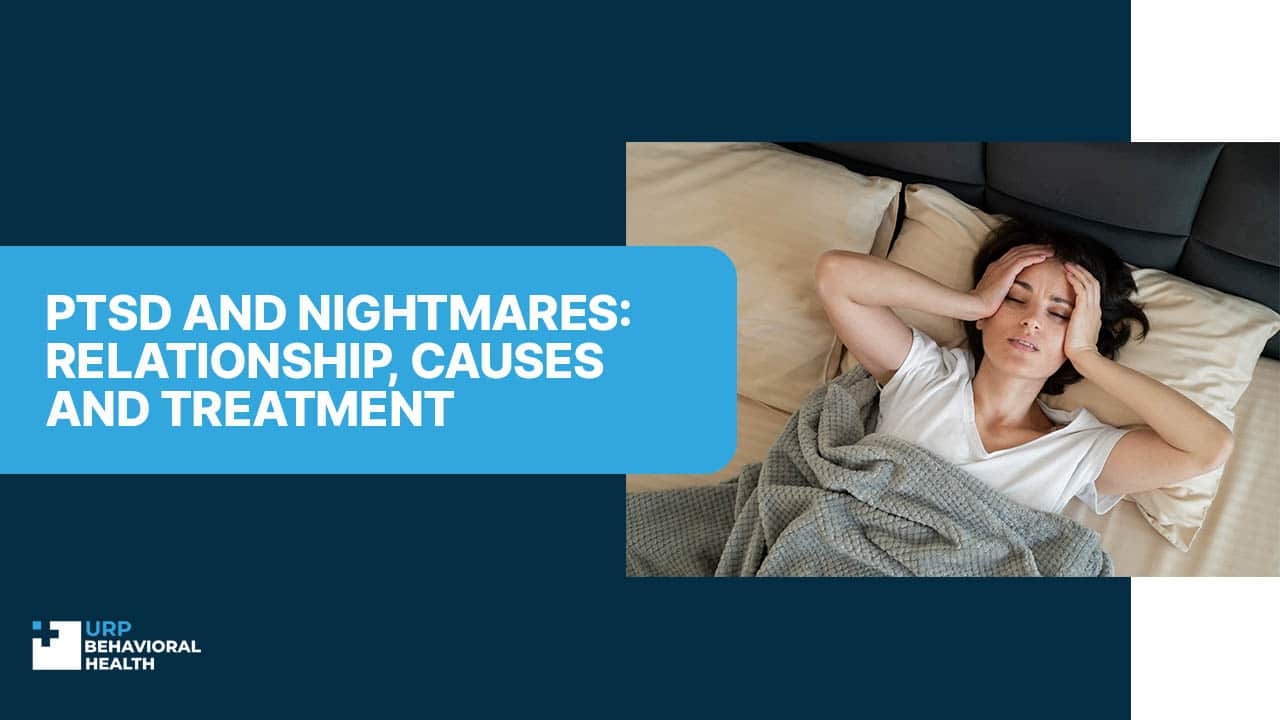
PTSD and Nightmares: Relationship, Causes and Treatment
Recognizing the connection between PTSD and nightmares is crucial for improving the health and well-being of those affected by these conditions. PTSD, triggered by experiencing or witnessing a traumatic event, and nightmares, which are distressing dreams that disrupt sleep and daily functioning, both significantly impact an individual’s quality of life. Understanding the link between these two conditions can lead to more effective treatments and better overall health outcomes for sufferers. The interplay between PTSD and nightmares underscores the importance of a comprehensive approach to diagnosis and treatment. Developing effective coping strategies requires a deep understanding of both PTSD and nightmares.
Connection Between PTSD and Nightmares
Research has shown a significant connection between PTSD and nightmares. Individuals with PTSD are more likely to experience frequent and severe nightmares compared to those without PTSD. The stress and anxiety associated with PTSD can lead to sleep disturbances, which can trigger nightmares. Additionally, the intrusive memories and flashbacks characteristic of PTSD can manifest as nightmares, further complicating the individual’s mental health [2]. Understanding this connection is essential for providing comprehensive care to patients suffering from both disorders. The connection between PTSD and nightmares can significantly impact daily life.
Don’t wait - confidential help is available right now for you or your loved one.
The exact mechanisms linking PTSD and nightmares are not yet fully understood, but several theories have been proposed. One theory suggests that the chronic stress associated with PTSD can lead to changes in brain chemistry and function, increasing the likelihood of nightmares. Another theory proposes that the heightened state of arousal and hypervigilance common in PTSD can trigger nightmares. These insights are crucial for developing targeted treatment strategies that address both conditions simultaneously. The connection between PTSD and nightmares underscores the importance of integrated care.
Why Does PTSD Cause Nightmares?
There is evidence to suggest that PTSD can indeed cause nightmares. The chronic stress and anxiety experienced by individuals with PTSD can lead to increased muscle tension, changes in brain chemistry, and heightened sensitivity to fear, all of which can contribute to the development of nightmares. Furthermore, the frequent sleep disturbances common in PTSD can also trigger nightmares. Addressing the root causes of PTSD can therefore play a crucial role in preventing and managing nightmares [3]. This highlights the need for integrated treatment approaches that address both mental health and sleep disorders simultaneously. Understanding why PTSD causes nightmares can help in developing effective treatment plans.
The relationship between PTSD and nightmares can also be influenced by individual factors such as genetics, lifestyle, and overall health. For example, individuals with a family history of sleep disorders may be more susceptible to developing nightmares if they also have PTSD. Additionally, lifestyle factors such as diet, exercise, and sleep hygiene can play a significant role in managing both PTSD and nightmares. By understanding and addressing these individual factors, healthcare providers can develop more personalized and effective treatment plans. Understanding the causes of PTSD nightmares is essential for effective intervention.
Causes of PTSD Nightmares
The possible causes of nightmares in individuals with PTSD are varied and complex. Chronic stress and anxiety can lead to changes in brain function and chemistry, which can contribute to the development of nightmares. Additionally, the intrusive memories and flashbacks characteristic of PTSD can manifest as nightmares, further complicating the individual’s mental health. Understanding the underlying causes of PTSD nightmares is essential for developing effective treatment strategies [4].
Our team will verify your insurance and design a plan tailored to your needs.
Other potential causes of PTSD nightmares include sleep disturbances, substance abuse, and co-occurring mental health disorders. Sleep disturbances, which are common in individuals with PTSD, can lead to nightmares, particularly during periods of extreme fatigue. Substance abuse can also exacerbate the symptoms of PTSD and increase the likelihood of nightmares. Co-occurring mental health disorders, such as depression and anxiety, can further complicate the presentation of PTSD and contribute to the development of nightmares. Addressing these causes is crucial for providing effective treatment for PTSD nightmares.
PTSD Nightmares Treatment
Treating PTSD and nightmares requires a comprehensive approach that addresses the unique needs of each condition. Psychotherapy, including cognitive-behavioral therapy (CBT) and eye movement desensitization and reprocessing (EMDR), is often effective in addressing the underlying trauma and reducing symptoms. For nightmares, techniques such as imagery rehearsal therapy (IRT), which involves rewriting the nightmare’s script in a more positive way, can help reduce the frequency and severity of nightmares. Combining these treatments can provide comprehensive care that addresses both conditions [2]. Effective treatment for PTSD nightmares often involves a multifaceted approach.
In addition to therapy, lifestyle changes such as regular exercise, healthy eating, and good sleep hygiene can support mental health and reduce symptoms of both PTSD and nightmares. Building a strong support network of friends, family, and mental health professionals is also crucial for recovery. By taking a holistic approach to treatment, individuals can improve their overall well-being and develop the skills needed to manage their symptoms effectively. Understanding treatment for PTSD nightmares is key for comprehensive care.
Conclusion
Recognizing and addressing the connection between PTSD and nightmares is vital for improving the health and well-being of those affected. Both conditions can have a profound impact on an individual’s quality of life, making it essential to understand how they interact and influence each other. By understanding the link between PTSD and nightmares, healthcare providers can develop more effective treatment strategies that address both conditions simultaneously. If you or someone you know is struggling with PTSD and nightmares, seeking professional help is crucial. Early intervention and comprehensive treatment can significantly improve outcomes and enhance quality of life [1][2][3]. URP Behavioral Health offers specialized care and support for individuals dealing with these challenging conditions, emphasizing the importance of integrated treatment approaches for optimal recovery.
Effective treatment for PTSD and nightmares requires a collaborative approach that addresses both the psychological and sleep-related aspects of these disorders. By providing comprehensive care that includes therapy, lifestyle changes, and support networks, individuals can achieve better mental health and manage their symptoms more effectively. If you or a loved one are experiencing symptoms of PTSD or nightmares, do not hesitate to seek professional help. Early diagnosis and comprehensive treatment are key to managing these conditions and improving overall well-being. With the right support and interventions, individuals can build resilience, develop healthier coping mechanisms, and lead more fulfilling lives. Addressing post traumatic nightmares is essential for long-term recovery.
We’ll help you understand your options and guide you toward care.
Sources
- [1] “PTSD Nightmares: What You Need to Know”. https://www.medicalnewstoday.com/articles/ptsd-nightmares
- [2] “Understanding PTSD and Nightmares”. https://www.sciencedirect.com/science/article/pii/S2468749923000236
- [3] “PTSD and Nightmares: Causes and Treatments”. https://pmc.ncbi.nlm.nih.gov/articles/PMC6263296/
- [4] “PTSD and Nightmares: A Review”. https://pmc.ncbi.nlm.nih.gov/articles/PMC8887778/
















